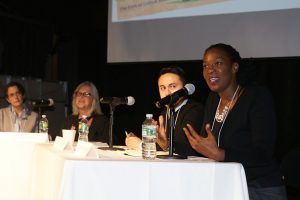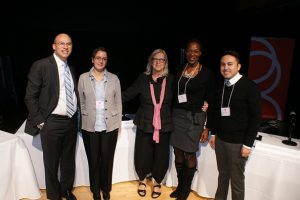 On October 17, Bank Street commemorated the start of its centennial with an inaugural symposium titled, “The Schools We Want.” The day of exploration and conversation engaged 250 faculty, alumni, students, and visiting scholars in discussions and workshops reflecting on the enduring values that infuse our work.
On October 17, Bank Street commemorated the start of its centennial with an inaugural symposium titled, “The Schools We Want.” The day of exploration and conversation engaged 250 faculty, alumni, students, and visiting scholars in discussions and workshops reflecting on the enduring values that infuse our work.
President Shael Polakow-Suransky, GSE ’00, moderated the opening panel, which addressed urgent questions around identity, integrity, and social justice. The panel included Bank Street faculty members Faith Lamb-Parker and Cristian Solorza, Columbia Professor Valerie Purdie-Vaughns, and Billie Gastic, Chief Research Officer at Relay Graduate School of Education.
The panelists looked at what educators can do to overcome biases to help children of different cultural backgrounds reach their full potential in the classroom. “We know all students need their developmental core to be validated, appreciated, and valued. They need to be inspired and their curiosity needs to be piqued. And that is not different for students of color,” Gastic said.
After the panel, workshops throughout the day looked at creating structures and strategies to support teachers, the benefits of field trips, how to talk to children about racial identity and advocacy, and more. One morning breakout session, led by Marjorie Brickley, GSE ’89, and Gabriel Guyton, GSE ’10, of the Graduate School, and Pamela Wheeler-Civita, GSE ’05, and Sarah Willis, GSE ’09, of the Family Center, focused on the importance of creating inclusive classrooms that allow space for children of all abilities to interact and learn together. “Educators in inclusive settings work to normalize difference, and they create environments where every individual is equally valued,” Willis said.
Additional breakout sessions covered the challenges of bringing progressive education to scale and how stereotypes impact achievement gaps among college students.

Cecelia Traugh, Dean of the Graduate School of Education, saw the symposium as an important opportunity for Bank Street educators to think together about how to apply their ideals of quality education in actual school settings. “At Bank Street, we share deeply held beliefs—grounded in research and observation—about what children need to grow and learn. We need to continue to explore how to bring those qualities to children and educators in less economically privileged communities, and do all we can to support such endeavors,” Dean Traugh said.
“Every panelist and attendee brought to the table a wealth of experience and insight. Bank Street values its commitment to exploring how we can be leaders in creating schools that allow all children to succeed,” said President Polakow-Suransky.